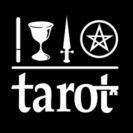Learning tarot meanings to help your readings is only part of the skill set. I started reading professionally long before I knew the meanings. Between readings I was avidly researching the books, matching up my insights and experiences with what was happening. In the end, I realised that parrot-like memorisation of the divinatory meanings was not very important. It is the insights you get when you look at the Tarot for the querent that counts. Although I provide lots of information, if you can grasp the basics on this page you will be a long way to being an expert reader.
Improving communication skills
Over 90 percent of all communication problems arise from differences in either semantics or perceptions. Semantics is about the way you define the meaning of a word or term. For example, ‘a tidy bedroom’ is something entirely different to parents and teenagers, and as you know, there are huge family battles over this innocuous phrase. The divinatory meanings and definitions are by definition from the past, and they change. Just because you have comfortable meanings, it does not mean that these meanings will not be applicable to your clients.
Perception is about how we interpret data. I understand words and phrases concepts differently to you – we all do. The traditional idea of a tarot reading, where the client sits arms folded, giving nothing away, while the reader talks at her. Fortunately this old style of reading is gradually being replaced by something special, something profound, that opens the gates to understanding between reader and client.
Listening – the great communication skill
How can we listen when giving a reading? After all, are we not there to impart precious knowledge to the client gleaned from the Tarot? The latter sentence is seductive, but the ability to listen, is something far more than mere cold readings.
Listening is easy – sounds go into our ears, and we hear the words – or do we? To truly listen to someone is to empower that person, who is elevated, as are we at the same time? Now, you may well be lucky enough to have excellent communication skills – you are a reader after all, but what about other people? Could it be that many of our clients come for a reading precisely because they are not listened to? Once we realise this possibility, we are in a powerful position to create a magical reading.
There is a balance needed, as so many caring people are empathic to point where they have completely forgotten their own voice. Assuming you are comfortable within yourself, you have the ability to go beyond yourself, your own context, and you can enter the world of the client.
Researchers report that there are five levels of listening:
| Listening Styles | |
|---|---|
| Ignoring | Within your frame of reference |
| Pretend listening (patronising) | |
| Selective listening | |
| Attentive listening | |
| Empathic listening | Within your client’s frame of reference |
Responsibility to our clients
When you read for a client, where are you listening from? I bet the client is used to the four listening styles. How do you feel when someone really listens to you? You feel good. Your client will too, and they will come back.
To listen empathically transcends another problem with reading the tarot – what the symbols mean. When you understand meaning, you are not fighting over symbols. The only true value is what it is to your client, who will truly thank you for intuition and sensitivity.
Mastering keywords
Once you have learned the basics, one or two keywords, and you can easily recognise the tarot, your confidence will grow, and you will not have the need to refer to a book when performing a reading. Despite being told elsewhere, you do not need to slavishly learn or memorise the meanings in order to do powerful readings. In fact, memorising is counter-productive, since if you sit there desperately trying to recollect the Divinatory Meaning (DM), you are not using the opportunity to see the greater picture. Remember driving lessons? You had problems co-ordinating the brakes, the accelerator, the clutch, indicators, mirrors, signalling… after a time, it all becomes automatic, and there are times when you get home without remembering the journey!
Tarot is fun and easy to learn when you realise that you do not have to memorise loads of ‘facts’. Supertarot Lessons make it even easier – all you have to know is the elemental associations – the good news is that there are only four!
If you can only recollect one or two things, you will do even better than someone who has memorised a lot. Supertarot combines the simple rules of the elements with basic meanings to create insightful, intelligent, articulate and meaningful readings that will inspire you.
Learning using Elemental Dignities means that you do not have to memorise loads of ‘facts’.
The combinations of the four elements can be combined to bring about new interpretations in a reading.

0 Comments